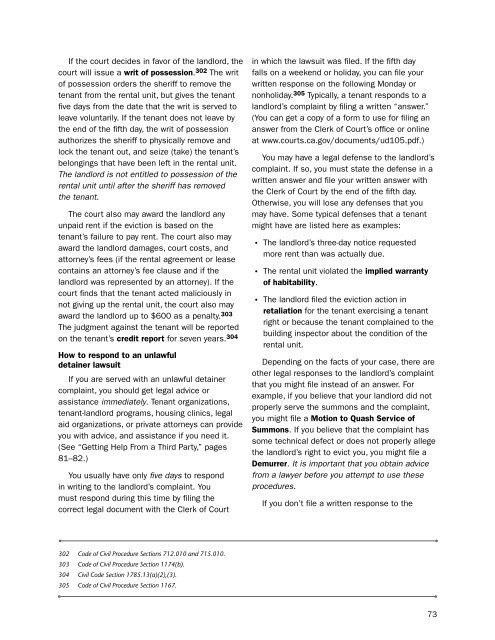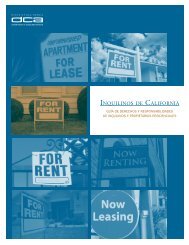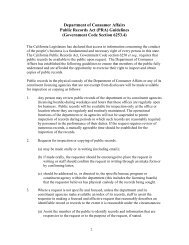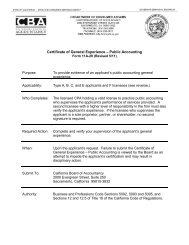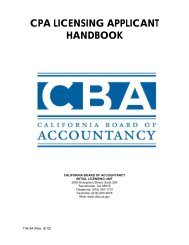California Tenants - Department of Consumer Affairs - State of ...
California Tenants - Department of Consumer Affairs - State of ...
California Tenants - Department of Consumer Affairs - State of ...
Create successful ePaper yourself
Turn your PDF publications into a flip-book with our unique Google optimized e-Paper software.
if the court decides in favor <strong>of</strong> the landlord, the<br />
court will issue a writ <strong>of</strong> possession. 302 the writ<br />
<strong>of</strong> possession orders the sheriff to remove the<br />
tenant from the rental unit, but gives the tenant<br />
five days from the date that the writ is served to<br />
leave voluntarily. if the tenant does not leave by<br />
the end <strong>of</strong> the fifth day, the writ <strong>of</strong> possession<br />
authorizes the sheriff to physically remove and<br />
lock the tenant out, and seize (take) the tenant’s<br />
belongings that have been left in the rental unit.<br />
The landlord is not entitled to possession <strong>of</strong> the<br />
rental unit until after the sheriff has removed<br />
the tenant.<br />
the court also may award the landlord any<br />
unpaid rent if the eviction is based on the<br />
tenant’s failure to pay rent. the court also may<br />
award the landlord damages, court costs, and<br />
attorney’s fees (if the rental agreement or lease<br />
contains an attorney’s fee clause and if the<br />
landlord was represented by an attorney). if the<br />
court finds that the tenant acted maliciously in<br />
not giving up the rental unit, the court also may<br />
award the landlord up to $600 as a penalty. 303<br />
the judgment against the tenant will be reported<br />
on the tenant’s credit report for seven years. 304<br />
How to respond to an unlawful<br />
detainer lawsuit<br />
if you are served with an unlawful detainer<br />
complaint, you should get legal advice or<br />
assistance immediately. tenant organizations,<br />
tenant-landlord programs, housing clinics, legal<br />
aid organizations, or private attorneys can provide<br />
you with advice, and assistance if you need it.<br />
(see “Getting help From a third party,” pages<br />
81–82.)<br />
You usually have only five days to respond<br />
in writing to the landlord’s complaint. You<br />
must respond during this time by filing the<br />
correct legal document with the Clerk <strong>of</strong> Court<br />
302 Code <strong>of</strong> Civil Procedure Sections 712.010 and 715.010.<br />
303 Code <strong>of</strong> Civil Procedure Section 1174(b).<br />
304 Civil Code Section 1785.13(a)(2),(3).<br />
305 Code <strong>of</strong> Civil Procedure Section 1167.<br />
in which the lawsuit was filed. if the fifth day<br />
falls on a weekend or holiday, you can file your<br />
written response on the following Monday or<br />
nonholiday. 305 typically, a tenant responds to a<br />
landlord’s complaint by filing a written “answer.”<br />
(You can get a copy <strong>of</strong> a form to use for filing an<br />
answer from the Clerk <strong>of</strong> Court’s <strong>of</strong>fice or online<br />
at www.courts.ca.gov/documents/ud105.pdf.)<br />
You may have a legal defense to the landlord’s<br />
complaint. if so, you must state the defense in a<br />
written answer and file your written answer with<br />
the Clerk <strong>of</strong> Court by the end <strong>of</strong> the fifth day.<br />
otherwise, you will lose any defenses that you<br />
may have. some typical defenses that a tenant<br />
might have are listed here as examples:<br />
• the landlord’s three-day notice requested<br />
more rent than was actually due.<br />
• the rental unit violated the implied warranty<br />
<strong>of</strong> habitability.<br />
• the landlord filed the eviction action in<br />
retaliation for the tenant exercising a tenant<br />
right or because the tenant complained to the<br />
building inspector about the condition <strong>of</strong> the<br />
rental unit.<br />
depending on the facts <strong>of</strong> your case, there are<br />
other legal responses to the landlord’s complaint<br />
that you might file instead <strong>of</strong> an answer. For<br />
example, if you believe that your landlord did not<br />
properly serve the summons and the complaint,<br />
you might file a motion to Quash service <strong>of</strong><br />
summons. if you believe that the complaint has<br />
some technical defect or does not properly allege<br />
the landlord’s right to evict you, you might file a<br />
demurrer. It is important that you obtain advice<br />
from a lawyer before you attempt to use these<br />
procedures.<br />
if you don’t file a written response to the<br />
73


